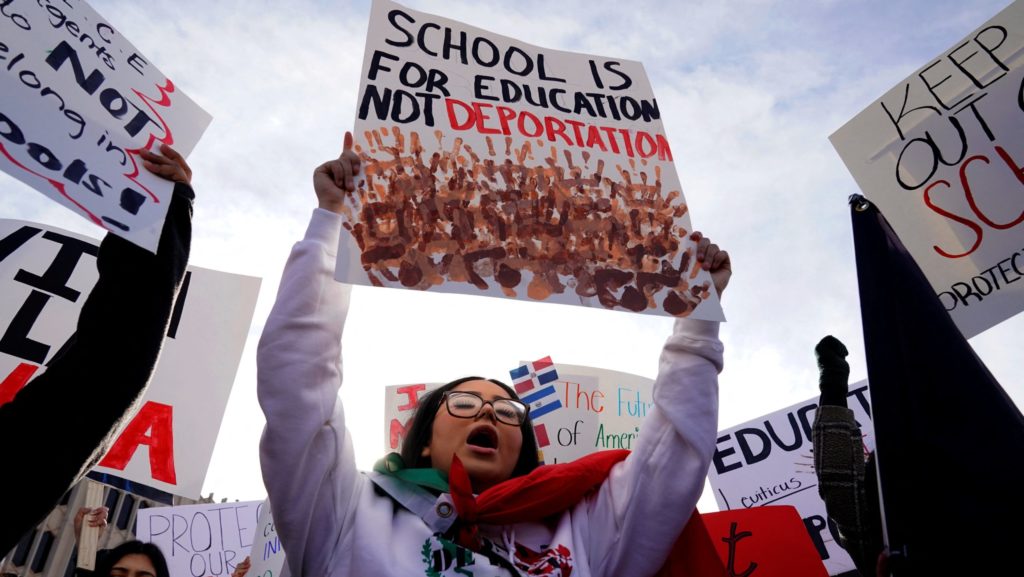More than two dozen Christian and Jewish groups filed a lawsuit Feb. 11 in federal court to challenge a Trump administration policy that rescinded long-standing restrictions on Immigration and Customs Enforcement agents from making arrests at what are seen as sensitive locations, including houses of worship, schools and hospitals.
The lawsuit, filed in U.S. District Court in Washington on behalf of groups ranging from Baptist to Jewish to Methodist, argues the new policy sparked fear of ICE raids both in their own congregations and in the populations they serve, lowering attendance at worship services and curtailing their ability to serve the less fortunate.
Kelsi Corkran, a lawyer with the Georgetown University Law Center's Institute for Constitutional Advocacy and Protection and lead counsel for the plaintiffs in the lawsuit, told reporters on a Feb. 11 press call that "welcoming the stranger or immigrant is a central precept" of each of their faith practices, "which means that plaintiffs, congregations and members embrace immigrants regardless of documentation or status."
Corkran argued the sanctuary policy change "is already substantially burdening their religious exercise" in violation of both the Religious Freedom Restoration Act and the First Amendment.
"Congregations are experiencing decreases in worship attendance and social service participation due to fears of ICE," she argued, and are being placed in an untenable position "where they have to choose whether or not to continue to welcome and encourage undocumented people into their places of worship consistent with their religious mission."
Previous presidential administrations, she added, "both Republican and Democrat, recognized that places of worship were sensitive vocations and substantially restricted their enforcement actions in those locations."
In a statement provided to OSV News, Tricia McLaughlin, the Department of Homeland Security's assistant secretary for public affairs, said, "We are protecting our schools, places of worship, and Americans who attend by preventing criminal aliens and gang members from exploiting these locations and taking safe haven there because these criminals knew law enforcement couldn't go inside under the previous Administration."
"DHS's directive gives our law enforcement the ability to do their jobs," McLaughlin.
But the department also suggested it expected such raids to be rare. However, ICE agents did arrest an individual at a Georgia church in January. ICE did not give specifics as to why the man was arrested but said he was wearing an ankle monitor and told media that if someone has a monitor, it is for a specific reason. The man's wife denied wrongdoing on his part in local media interviews.
The previous policy had exceptions for public safety or national security threats.
Rabbi Rick Jacobs, president of Union for Reform Judaism, said on the press call that his organization joined the lawsuit "to stand up and with courage and with conviction express the depths of our religious faith and our trust in what America has been and must continue to be."
The U.S. Conference of Catholic Bishops was not a party in the lawsuit. However, some bishops have criticized the changes to the sanctuary policy.
Bishop Mark J. Seitz of El Paso, Texas, said in a Jan. 21 statement that policy change was one of "many drastic actions from the federal government related to immigration that deeply affect our local community and raise urgent moral and human concerns."
The lawsuit came the same day Pope Francis released a letter to U.S. Catholics and people of goodwill to not give in to "narratives" that discriminate against and cause unnecessary suffering to migrants and refugees.
While acknowledging "the right of a nation to defend itself and keep communities safe from those who have committed violent or serious crimes while in the country or prior to arrival," Pope Francis cautioned "deporting people who in many cases have left their own land for reasons of extreme poverty, insecurity, exploitation, persecution or serious deterioration of the environment, damages the dignity of many men and women, and of entire families, and places them in a state of particular vulnerability and defenselessness."

